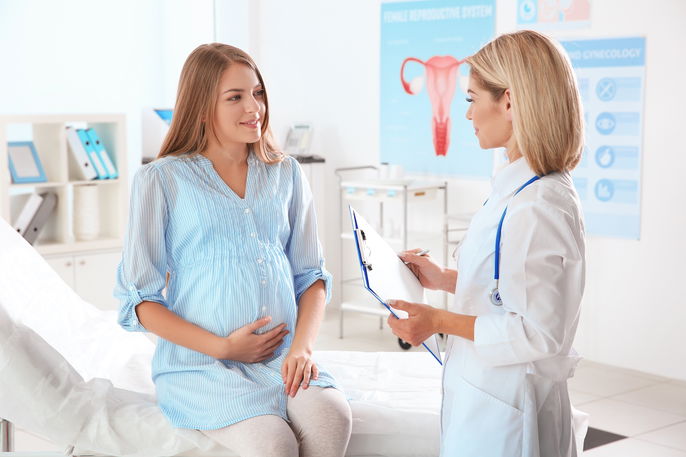A yeast infection during pregnancy is a very common situation among pregnant women. During this period, estrogen levels are higher, favoring the growth of fungi, especially Candida albicans, which in naturally found in the woman's vagina.
Yeast infections during pregnancy do not harm the baby, but if the baby is born vaginally and the woman has an active yeast infection, the baby may be infected and present with a yeast infection in its first days of life.
If the baby is infected, he or she may present whitish plaques inside the mouth, also known as thrush, and when breastfeeding he or she may transmit the fungus again to the mother, who may develop a breast fungal infection. This can make the initiation of breastfeeding difficult.

Common symptoms
The main symptoms of a yeast infection during pregnancy are:
- White, milk-like discharge
- Intense itching in the vagina
- Burning or pain when urinating
- Pain during sex
- Genital swelling and redness
In addition, pregnant women may also experience pain or burning when urinating. Some of the symptoms can present very similarly to a UTI, which is another common infection during pregnancy.
If you are pregnant and notice symptoms of a yeast infection, you should consult your OBGYN for assessment and possible treatment.
Online symptom checker
Report your symptpoms below if you think you may have a yeast infection:
This online test is only a guidance tool and does not replace a consultation with an obstetrician.
Confirming a diagnosis
A yeast infection diagnosis is made by an OBGYN or family doctor through an evaluation of the woman's symptoms and health history, and through a pelvic exam.
Yeast infections can promote the development of other microorganisms, and the doctor may also perform a pap smear to check for any other possible infections.
What causes a yeast infection during pregnancy?
Most of the time, yast infections in pregnant women occur due to hormonal changes that are normal during preganncy. It is usually not hte result of sexual contact with an infected person.
Can yeast infections harm the baby?
Yeast infections during pregnancy do not cause changes in the fetus, but when it is left untreated, it can be transmitted to the newborn during birth. It can lead to oral thrush in the baby, which can pass on to the mother's breast during breastfeeding. This can interfere with breastfeeding intiation due to pain and discomfort.
Treatment options
The treatment of yeast infections during pregnancy should be oriented by an OBGYN or family doctor, who may prescribe vaginal creams or antifungal ointments.
Commonly prescribed medications include nystatin, clotrimazole, miconazole or terconazole. These medications should always be approved by your OBGYN to ensure that they do not harm the pregnancy.
Normally, yeast infection ointments should be applied daily to the vagina once a day, for 7 to 10 days, as prescribed.
Yeast infections that do not present with symptoms should still be treated, so that the infection is not transmitted to the baby during birth.
How to recovery quickly
To complement the treatment prescribed by your doctor, you can also:
- Avoid sweet or carbohydrate-rich foods
- Always wear cotton underwear
- Avoid wearing very tight pants
- Perform genital hygiene with only water and mild soap
- Opt for white, unscented toilet paper
- Avoid scented panty liners
Be sure to check out the candida diet, and which foods you should eat and avoid during a yeast infection.
Natural treatment options
A great natural option to complement your prescribed treatment of yeast infections during pregnancy and relieve itching is to take a sitz bath with 2 liters of warm water and 1 cup of apple cider vinegar.
Be sure to soak in this mixture for at least 30 minutes and to do this once a day, before taking a shower-
How to prevent
Although it is not possible to control hormones, there are some precautions that can reduce the risk of developing a yeast infection during pregnancy, which include:
- Wear cotton underwear to prevent increased moisture and heat in the genital area
- Dry the genital area well after bathing
- Avoid using vaginal products, such as scented soap or perfumes
- Sleep without underwear or pants, as this allows the skin to remain dry during the night
- Avoid douching, as these can alter vaginal flora and facilitate the growth of fungi.
Furthermore, pregnant women can also opt for an increase in foods containing Lactobacillus acidophilus, such as yogurt, as these contain probiotics, which help control the growth of fungi. Read more about naturally probiotic foods you can include in your diet.






























